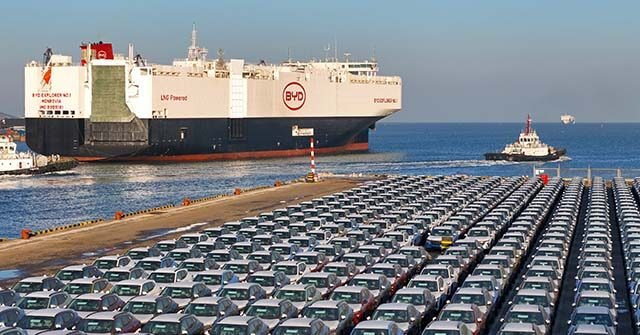Brazilian managers of the automobile {industry} and staff develop uncomfortably over the circulate of low-cost electrical automobiles (EVs) that flows from China, as a result of the Chinese language assault crushes Brazilian manufacturing.
The one protection, in keeping with the automobile {industry}, are greater charges for Chinese language import.
A part of the issue is that Brazil has saved its charges on Chinese language import, whereas most different clients for Chinese language EVs raised theirs to double digits. Europe overwhelmed A price of 38 % on Chinese language EVs final July, particularly to deal with the dumping of Chinese language. President Donald Trump elevated American charges on Chinese language automobiles as much as one hundred pc in April.
The speed of Brazil on EVs was zero from 2015 to 2024, when it was elevated to a modest ten %. When Chinese language automobile giants reminiscent of BYD looked for markets to dump the extreme stock of vehicles backed by the federal government with which they produce Suspected low-cost laborBrazil was one of many few massive markets that remained simply accessible.
Reuters reported On Thursday it’s anticipated that the Chinese language automobile in Brazil will improve by 40 % this yr, accounting for nearly eight % of the registrations of the sunshine automobile. Not less than 80 % of Brazil electrical automobiles are Chinese language import, and a few estimates say it’s nearer to 90 %. A few of the largest cargo ships on this planet are the feeding of Chinese language vehicles to Brazil. When the Brazilian authorities introduced applications to pump up the EV gross sales, BYD had an enormous stock able to go.
Brazil needed importers to construct native factories for his or her electrical automobiles, and BYD promised to do that, and introduced plans in 2023 to renovate an previous Ford manufacturing facility. Brazil, nevertheless, stopped issuing Werkvisa to BYD in December accusations These Chinese language workers who had been dropped at the Brazilian manufacturing facility had been handled as slaves.
Work on the BYD EV -Fabriek has been delayed for not less than 18 months and Brazilian officers started to suspect that different Chinese language initiatives may use slavery of their nation. Within the meantime, the tidal wave of low-cost imports from BYD, GWM and different Chinese language firms hold coming.
“We assist the arrival of recent manufacturers in Brazil to supply the sector, to advertise the componence sector, create jobs and produce new applied sciences. However from the second an extra of imports brought on decrease investments in manufacturing in Brazil, that worries us,” Brazilian Headvet informed READ igorters.
The Brazilian authorities introduced to lift the charges on Chinese language vehicles in sluggish will increase and to climb the six months till they attain 35 % someplace in 2026, however automobile leaders and labor officers foyer the federal government to extend the charges quicker to afford quicker safety.
Byd just isn’t ready for the hammer to fall. The corporate sent 7,300 EVs to Brazil in Could and rushes to arrange extra large shipments, whereas the charges are nonetheless low. Critics accused China of gaming a system that was imagined to stimulate manufacturing and create jobs in Brazil, and have confused their very own authorities for organising a system that gave the impression to be retrospective tailored for bathe advantages on Chinese language firms with gigantic shares of Brazil, whereas the EV-industry of.
Sadly, the brand new proposal to speed up charges is Additionally Working because the benefit of Chinese language firms, as a result of Brazilian customers are hurrying to purchase Chinese language vehicles on the string costs earlier than commerce obstacles rise. The retail gross sales of imported vehicles elevated by 18.7 % within the first quarter of 2025, whereas the home turnover was solely 0.2 % on the tag. EVs usually promote significantly better in Latin -America than North America, and most of that turnover development goes to Chinese language manufacturers.
“Brazil is at a crossroads. Or it positions itself as an vital actor within the rising provide chains for electromobility and clear vitality – the era of jobs, innovation and technological sovereignty – or is restricted to meeting applied sciences that lose alternatives in a brand new international industrial cycle,” College of Campinas.



